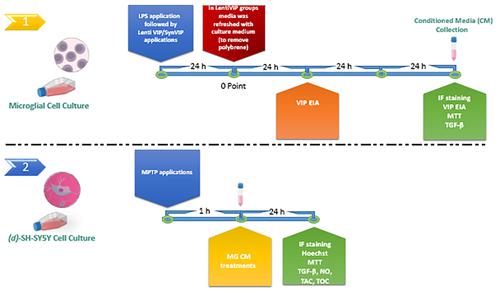当前位置:
X-MOL 学术
›
Eur. J. Nerosci.
›
论文详情
Our official English website, www.x-mol.net, welcomes your feedback! (Note: you will need to create a separate account there.)
Microglia cells treated with synthetic vasoactive intestinal peptide or transduced with LentiVIP protect neuronal cells against degeneration
European Journal of Neroscience ( IF 3.4 ) Pub Date : 2024-02-21 , DOI: 10.1111/ejn.16273 Azize Yasemin Goksu 1, 2 , Fatma Gonca Kocanci 3 , Ersin Akinci 4, 5 , Devrim Demir‐Dora 2, 6 , Fulya Erendor 2, 7 , Salih Sanlioglu 2 , Hilmi Uysal 8
European Journal of Neroscience ( IF 3.4 ) Pub Date : 2024-02-21 , DOI: 10.1111/ejn.16273 Azize Yasemin Goksu 1, 2 , Fatma Gonca Kocanci 3 , Ersin Akinci 4, 5 , Devrim Demir‐Dora 2, 6 , Fulya Erendor 2, 7 , Salih Sanlioglu 2 , Hilmi Uysal 8
Affiliation

|
A common pathological hallmark of neurodegenerative disorders is neuronal cell death, accompanied by neuroinflammation and oxidative stress. The vasoactive intestinal peptide (VIP) is a pleiotropic peptide that combines neuroprotective and immunomodulatory actions. The gene therapy field shows long-term promise for treating a wide range of neurodegenerative diseases (ND). In this study, we aimed to investigate the in vitro efficacy of transduction of microglia using lentiviral gene therapy vectors encoding VIP (LentiVIP). Additionally, we tested the protective effects of the secretome derived from LentiVIP-infected “immortalized human” microglia HMC3 cells, and cells treated with Synthetic VIP (SynVIP), against toxin-induced neurodegeneration. First, LentiVIP, which stably expresses VIP, was generated and purified. VIP secretion in microglial conditioned media (MG CM) for LentiVIP-infected HMC3 microglia cells was confirmed. Microglia cells were activated with lipopolysaccharide, and groups were formed as follows: 1) Control, 2) SynVIP-treated, or 3) LentiVIP-transduced. These MG CM were applied on an in vitro neurodegenerative model formed by differentiated (d)-SH-SY5Y cells. Then, cell survival analysis and apoptotic nuclear staining, besides measurement of oxidative/inflammatory parameters in CM of cells were performed. Activated MG CM reduced survival rates of both control and toxin-applied (d)-SH-SY5Y cells, whereas LentiVIP-infected MG CM and SynVIP-treated ones exhibited better survival rates. These findings were supported by apoptotic nuclear evaluations of (d)-SH-SY5Y cells, alongside oxidative/inflammatory parameters in their CM. LentiVIP seems worthy of further studies for the treatment of ND because of the potential of gene therapy to treat diseases effectively with a single injection.
中文翻译:

用合成血管活性肠肽处理或用 LentiVIP 转导的小胶质细胞可保护神经元细胞免于变性
神经退行性疾病的常见病理特征是神经元细胞死亡,并伴有神经炎症和氧化应激。血管活性肠肽(VIP)是一种结合了神经保护和免疫调节作用的多效性肽。基因治疗领域显示出治疗多种神经退行性疾病(ND)的长期前景。在本研究中,我们旨在研究使用编码 VIP (LentiVIP) 的慢病毒基因治疗载体转导小胶质细胞的体外疗效。此外,我们还测试了源自 LentiVIP 感染的“永生化人类”小胶质细胞 HMC3 细胞和经合成 VIP (SynVIP) 处理的细胞的分泌蛋白组对毒素诱导的神经变性的保护作用。首先,生成并纯化稳定表达VIP的LentiVIP。证实了 LentiVIP 感染的 HMC3 小胶质细胞在小胶质细胞条件培养基 (MG CM) 中的 VIP 分泌。小胶质细胞用脂多糖激活,并按如下方式形成组:1) 对照,2) SynVIP 处理,或 3) LentiVIP 转导。这些 MG CM 应用于由分化的(d)-SH -SY5Y 细胞形成的体外神经退行性模型。然后,除了测量细胞CM中的氧化/炎症参数外,还进行细胞存活分析和凋亡核染色。激活的 MG CM 降低了对照细胞和应用毒素的(d)-SH -SY5Y 细胞的存活率,而 LentiVIP 感染的 MG CM 和 SynVIP 处理的细胞表现出更好的存活率。(d)-SH -SY5Y 细胞的凋亡核评估及其 CM 中的氧化/炎症参数支持了这些发现。 LentiVIP 似乎值得进一步研究 ND 的治疗,因为基因疗法具有通过单次注射有效治疗疾病的潜力。
更新日期:2024-02-21
中文翻译:

用合成血管活性肠肽处理或用 LentiVIP 转导的小胶质细胞可保护神经元细胞免于变性
神经退行性疾病的常见病理特征是神经元细胞死亡,并伴有神经炎症和氧化应激。血管活性肠肽(VIP)是一种结合了神经保护和免疫调节作用的多效性肽。基因治疗领域显示出治疗多种神经退行性疾病(ND)的长期前景。在本研究中,我们旨在研究使用编码 VIP (LentiVIP) 的慢病毒基因治疗载体转导小胶质细胞的体外疗效。此外,我们还测试了源自 LentiVIP 感染的“永生化人类”小胶质细胞 HMC3 细胞和经合成 VIP (SynVIP) 处理的细胞的分泌蛋白组对毒素诱导的神经变性的保护作用。首先,生成并纯化稳定表达VIP的LentiVIP。证实了 LentiVIP 感染的 HMC3 小胶质细胞在小胶质细胞条件培养基 (MG CM) 中的 VIP 分泌。小胶质细胞用脂多糖激活,并按如下方式形成组:1) 对照,2) SynVIP 处理,或 3) LentiVIP 转导。这些 MG CM 应用于由分化的(d)-SH -SY5Y 细胞形成的体外神经退行性模型。然后,除了测量细胞CM中的氧化/炎症参数外,还进行细胞存活分析和凋亡核染色。激活的 MG CM 降低了对照细胞和应用毒素的(d)-SH -SY5Y 细胞的存活率,而 LentiVIP 感染的 MG CM 和 SynVIP 处理的细胞表现出更好的存活率。(d)-SH -SY5Y 细胞的凋亡核评估及其 CM 中的氧化/炎症参数支持了这些发现。 LentiVIP 似乎值得进一步研究 ND 的治疗,因为基因疗法具有通过单次注射有效治疗疾病的潜力。



























 京公网安备 11010802027423号
京公网安备 11010802027423号